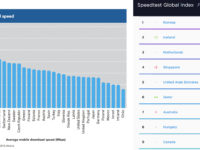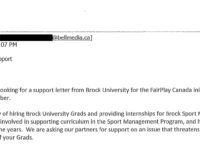The release this week of the Montreal Economic Institute’s telecommunications report has the feel of a last gasp for a dying argument about the state of Canadian wireless. Gone are the days of telecom companies and their supporters denying that Canadian wireless prices are high relative to other countries. In its place are arguments seeking to justify high prices on the basis of claims that Canada has better networks and challenging geography. What is striking about the latest report is how these arguments fail upon closer inspection with the MEI resorting to creating incomplete data charts on network quality and failing to grapple with countries that have better networks, better pricing, and less wireless density.
 Articles by: Michael Geist
Articles by: Michael Geist
House of Commons Ethics Committee Recommends Rejecting Bell Coalition Website Blocking Plan
The Standing Committee on Access to Information, Privacy and Ethics has released its net neutrality report, strongly endorsing net neutrality safeguards and calling on the government to reject the Bell coalition’s website blocking plan should the CRTC approve it. I was the first witness to appear before the committee on the study, where I emphasized the need for stronger net neutrality enforcement, the risks associated with changing U.S. policy, and the concerns associated the Bell website blocking proposal (which at the time had only been leaked). The committee picked up on all those issues, recommending enshrining net neutrality in the Telecommunications Act, calling on the government to seek assurances from the U.S. that its policies will not undermine Canadian traffic, and encouraging the CRTC to more proactively ensure that ISPs are compliant with Canadian law.
The committee report also waded into the site blocking issue, calling on the government to reject it should it be approved by the CRTC.
Bell Backroom Pressure: Internal Documents Reveal How a Brock University Executive Came to Provide Support for Website Blocking
Among the thousands of interventions at the CRTC to the Bell coalition website blocking plan, one of the submissions that stands out comes from Brian Hutchings, Brock University’s Vice-President, Administration. The submission claims that “Brock ardently supports the FairPlay Canada coalition” adding that “we are committed to assist the members of the coalition and the CRTC in eliminating the theft of digital content.” The submission sparked an immediate campus backlash. The Brock University Faculty Association filed a submission with the CRTC noting:
we stand in opposition to the intervention by Vice President, Administration on behalf of Brock University. Vice-President Hutching’s intervention was undertaken without consultation with the wider Brock University community, including faculty, librarians, and Senate; therefore, his submission should not be seen as indicative of the views of Brock University as a whole.
Springer Nature Opens Up on Educational Publishing: “E-Piracy” Sites Do Not Replace Traditional Subscription Services, Business Risks Primarily Stem from Marketplace Changes
Springer Nature, one of the world’s largest publishers of journals and electronic books has filed a prospectus for the purposes of an initial public offering. The prospectus is a fascinating read as it eschews the usual lobbying talking points in favour of legally required frank disclosure. For example, the document provides considerable insights into the continuing emergence of open access, noting that 27% of all research articles published by Springer Nature in 2017 was published on an open access basis.
The prospectus contains several discussions that are directly relevant to the Canadian copyright review.
Canadian Publisher on the Term of Copyright: Life Plus 50 Years is “Already Too Long”
Broadview Press, an independent Canadian publisher with hundreds of books in print, has called on the government to ensure that there is no extension from the current term of life of the author plus 50 years. I previously noted the Broadview Press submission in a post on the tiny impact of reduced royalties from Access Copyright. The submission also focuses on copyright term:
Another vitally important copyright issue that has been on the table in recent TTP and NAFTA trade negotiations is the international pressure Canada is faced with to increase the length of the copyright term from 50 years after the death of the author (already too long, in our opinion) to a full 70 years after the death of the author, thereby preventing for an additional generation the publication of competing editions of literary classics—editions that can often be of immense cultural and pedagogical value.

![By Davepark [CC BY-SA 3.0 (https://creativecommons.org/licenses/by-sa/3.0)], from Wikimedia Commons, https://commons.wikimedia.org/wiki/File:Fairplay_sign.jpg](https://www.michaelgeist.ca/wp-content/uploads/2018/05/1024px-Fairplay_sign-200x150.jpg)









